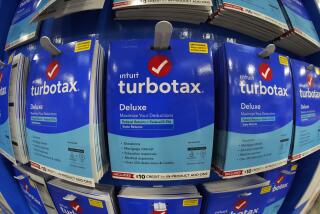Toshiba OKs Settlement of $1 Billion Over Laptops
- Share via
Toshiba Corp. agreed Friday to pay at least $1 billion to settle allegations that it sold 5.5 million defective laptop computers to American consumers, one of the largest settlements of its kind.
The settlement, which will be distributed in the form of coupons and cash rebates, applies to all Toshiba laptops sold in the U.S. since 1987 and involves a computer glitch that can erase data being saved to a floppy disk.
The Tokyo-based company--which has fallen from first to fourth in the U.S. laptop market this year--said it agreed to settle the 7-month-old class-action lawsuit filed in Texas even though no consumer ever complained of losing data as a result of the glitch. The settlement received tentative approval from a U.S. district judge in Beaumont, Texas, on Thursday.
“We took these actions to reassure our customers of our total commitment to quality,” said Joseph Formichelli, executive vice president of Toshiba American Information Systems, the U.S. arm of the company, based in Irvine.
Under the terms of the settlement, owners of 5.5 million laptops will be eligible for at least a $100 coupon for Toshiba products. Unlike customers in many settlements involving coupons, the Toshiba owners will be able to sell their coupons or use multiple coupons toward a single purchase. About 1.8 million laptops bought after March 5, 1998, a year before the suit was filed, will be eligible for additional cash rebates averaging $330.
The problem with the computers, in a device known as the floppy drive controller, had attracted virtually no attention before Toshiba’s surprise announcement late Thursday.
Company officials said they had been unable to re-create the problem in the lab, except when trying to save something to a disk while simultaneously doing one or two other intensive tasks, such as playing a game or watching a video.
But NEC Corp., which made some of the hardware, later warned Toshiba of chip problems that caused the problems with saving material. That warning, which had been previously ignored, emerged as the key evidence in prompting Toshiba to settle, company officials said.
The settlement comes at a time when the computer maker is struggling with declining market share in the U.S. and its second straight year of fiscal losses.
The U.S. is Toshiba’s most important market, and the company ranked No. 1 in the country in laptop sales last year, according to International Data Corp., a market research firm in Framingham, Mass.
But over the last year, Toshiba has slipped behind aggressive competitors Dell Computer Corp., IBM Corp. and Compaq Computer Corp., with 14.8% of the market in the second quarter of this year, according to IDC’s Bruce Stephen.
Toshiba said Friday it will take a charge of $1 billion “in connection with” the deal, although the settlement document says the deal has a face value of $2.1 billion. Toshiba did not rule out charges in future years if more customers than expected redeem the coupons. The suit may continue against NEC, said George Shipley, a spokesman for the plaintiffs.
Toshiba lost $431 million in the six months ended Sept. 30. It said Oct. 26 that it anticipated losing $280 million in the full year, a figure it revised Friday to accommodate the new charge.
In Japan, Toshiba said it agreed to the settlement in part because a jury verdict could have approached $10 billion.
Under the complex terms of the preliminary settlement, Toshiba customers will be offered software patches for the problem, hardware fixes if desired and coupons. The most recent buyers, with proof of purchase, will get additional cash rebates on a sliding scale determined by the age of the machine.
After the terms of the proposed settlement are advertised next month, customers can object in court or opt out of the class-action suit and sue on their own.
But an unusual provision in the Toshiba deal calls for any unredeemed amount up to a $1-billion limit to be donated to schools, libraries or other charities in the form of Toshiba equipment.
Competition among manufacturers has forced Toshiba to be more concerned about bad publicity than the technical problem itself. With a settlement, “there’s a little bit more of customer care,” Stephen said.
“Any time there’s a public disclosure of a problem, it can put a tarnish on your image,” Stephen said.
Yet Toshiba may win points in the public eye by owning up to the issue, in contrast to Intel Corp., which was criticized for initially refusing to replace Pentium chips that carried an admitted calculating flaw.
More to Read
Inside the business of entertainment
The Wide Shot brings you news, analysis and insights on everything from streaming wars to production — and what it all means for the future.
You may occasionally receive promotional content from the Los Angeles Times.










